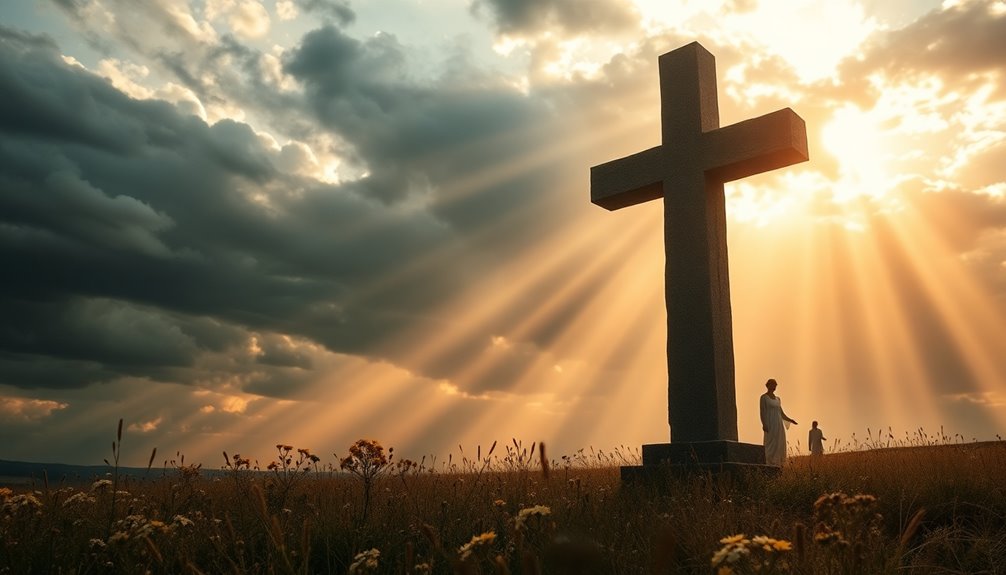The Rapture is a significant concept in Christian belief, representing the moment when believers are taken up to unite with Christ. This event assures you of eternal life and embodies the hope of transformation, promising a glorious reunion in His presence. Key biblical passages like 1 Thessalonians 4:16-17 and 1 Corinthians 15:51-52 provide the foundation for this doctrine. There are various interpretations regarding its timing, leading to rich discussions within Christian communities. Engaging with these topics can enhance your understanding and spiritual vigilance as you explore the depths of this important theological concept.
Key Takeaways
- The Rapture signifies the promise of eternal life and a glorious reunion with the Lord for believers.
- Key biblical passages, such as 1 Thessalonians 4:16-17, provide a scriptural basis for the Rapture.
- Various interpretations exist regarding the Rapture's timing, including pre-tribulation and post-tribulation views.
- Daily spiritual preparedness and group prayer meetings enhance believers' readiness for the Rapture.
- Early Christians held strong apocalyptic beliefs, viewing the Rapture as essential to their identity and faith practice.
Introduction

For many, the belief in the Rapture serves as a beacon of hope and comfort, emphasizing the promise of eternal life with the Lord.
It highlights the transformative power of Christ's return, assuring believers that they'll experience a glorious reunion in His presence.
Scriptural Basis for Rapture

When exploring the scriptural basis for the Rapture, you'll find key passages that provide insight into this event.
In 1 Thessalonians 4:16-17, Paul vividly describes believers being caught up to meet the Lord.
Additionally, references in John 14 and Matthew 24 further support this transformative promise for the faithful.
Primary Bible References
The Rapture is deeply rooted in Scripture, with key references illuminating this pivotal event. In 1 Thessalonians 4:16-17, Paul describes the coming of the Lord, where the dead in Christ will rise first, followed by living believers being caught up in the clouds. This passage emphasizes the hope of resurrection and reunion with Christ.
Moreover, 1 Corinthians 15:51-52 highlights the instantaneous nature of this event, stating that at the last trumpet, the dead will be raised imperishable, and the living transformed. This moment underscores the urgency and certainty of the Rapture.
Jesus Himself spoke of His return in John 14:2-3, assuring His followers that He's preparing a place for them and will come again to receive them.
Philippians 3:20 further reinforces this anticipation, reminding you that your citizenship is in heaven, and you eagerly await the Savior, the Lord Jesus Christ, who'll transform your body.
Finally, James 5:8 encourages you to be patient, as the coming of the Lord is near, reinforcing the hope and expectation surrounding the Rapture.
These passages together form a solid foundation for understanding this transformative event.
Secondary Bible References
Building on the foundational verses that highlight the Rapture, several secondary references in Scripture further support this belief. For instance, 1 Corinthians 15:51-52 speaks about a moment when the dead will be raised imperishable, and the living will be transformed at the last trumpet. This transformation underscores the hope believers have in the Rapture, as it emphasizes the imminent coming of Jesus Christ.
Philippians 3:20-21 reminds you that your citizenship is in heaven, and it fuels the anticipation of being transformed to be like Christ. Similarly, James 5:8 encourages you to be patient, for the coming of the Lord is at hand. This reflects the Church's eager expectation for the Rapture.
Moreover, Revelation 3:10 offers a promise to faithful believers, stating they'll be kept from the hour of trial coming upon the world, reinforcing the idea of the Rapture occurring before tribulation.
Together, these secondary references strengthen the scriptural basis for the Rapture, affirming the belief that you'll one day meet the Lord in the clouds, fully transformed in His presence.
Early Christian Apocalyptic Beliefs

Rooted in the expectation of Christ's imminent return, early Christian apocalyptic beliefs shaped the faith's identity and practices. Early Christians eagerly anticipated the Rapture, a time when believers would be gathered to meet the Lord, as described in 1 Thessalonians 4:16-17.
You'd find that these teachings emphasized readiness for Christ's coming amid tribulation and persecution, providing hope and a moral framework for living.
These beliefs also involved a chiliastic view, where early followers envisioned a literal thousand-year reign of Christ on earth, based on interpretations of Revelation 20. This anticipation of the Second Coming defined their eschatological outlook and encouraged a vibrant community of faith.
Influential figures like Eusebius and other Church Fathers played a crucial role in framing these apocalyptic ideas, connecting them to historical events and the fulfillment of biblical prophecies.
In this context, early Christians saw apocalyptic events not just as future predictions but as vital motivators for ethical living, urging you to remain steadfast in your faith.
Their collective hope in the Rapture and Christ's return created a foundation that still resonates within Christian thought today.
Theological Significance of Rapture

Amidst varying theological perspectives, the Rapture holds significant meaning for believers, offering comfort and hope as they await Christ's return. This pivotal event, often discussed in 1 Thessalonians 4:18, encourages you to support one another in anticipation of the transformation that awaits both the living and the deceased.
Theological interpretations of the Rapture differ; pretribulationists view it as a rescue from the tribulation, while posttribulationists see it occurring after this challenging period. Despite these differences, many theologians argue that the Rapture distinctly separates Christ's coming for the Church from His second coming to judge the nations.
This distinction enhances its theological significance, reminding you that the Rapture isn't merely a future event but a call to live in readiness and vigilance. As a believer, this doctrine urges you to remain faithful and engaged in your faith community, fostering an environment of hope and anticipation.
Ultimately, the Rapture embodies the promise of transformation, assuring you that you'll receive a glorified body, as described in 1 Corinthians 15:51-52, reinforcing the joy and hope found in Christ's coming.
Misunderstanding Rapture's Timing

When it comes to the Rapture, misconceptions about its timing can create confusion among believers.
You might find yourself caught between differing views—whether it happens before, during, or after tribulation.
Understanding these discrepancies is crucial for grasping the broader implications of this significant event.
Address Common Misconceptions
While many people have strong opinions about the timing of the Rapture, it's important to recognize that misconceptions abound. A common misunderstanding is the belief that all Christians agree on when the Rapture occurs. In fact, views range from pretribulationism, which claims the Rapture happens before the tribulation, to posttribulationism, asserting it takes place at the end. Midtribulationism falls in between, suggesting the Rapture occurs during the tribulation.
Another misconception involves the relationship between the Rapture and the Second Coming. Some people think these events are distinct, but many amillennialists and postmillennialists view them as a single event that unfolds simultaneously. This confusion often arises from interpretations of key biblical passages like 1 Thessalonians 4:16-17 and Matthew 24:29-31, which can support various timing perspectives.
Additionally, historical predictions about the Rapture have led to skepticism. Failed forecasts by figures like William Miller and Harold Camping serve as reminders that trying to pinpoint an exact timing can lead to disappointment.
Timing Discrepancies Among Believers
The timing of the Rapture often leaves believers divided, each group holding firmly to its interpretation.
Pretribulationists assert that the Rapture will occur before the Tribulation, allowing believers to escape impending judgment. In contrast, posttribulationists argue that the Rapture happens at the end of the Tribulation, meaning you'll endure significant hardships. Midtribulationists find themselves in the middle, believing the Rapture occurs halfway through the Tribulation.
There's also the pre-wrath perspective, suggesting that the Rapture will take place just before God's final wrath is unleashed, providing a protective measure for believers.
Adding to the confusion, amillennialists and postmillennialists often reject the idea of a separate Rapture event, viewing it as simultaneous with the Second Coming instead.
This diversity of thought leads to misunderstandings and differing beliefs across Christian denominations. Failed predictions and varying interpretations of key biblical passages only exacerbate the situation.
As a believer, navigating these discrepancies can feel overwhelming, but understanding these perspectives can help you engage in meaningful discussions about the Rapture and its timing.
Daily Spiritual Preparedness Strategies

To stay spiritually prepared for the Rapture, you can start each day with prayer and reflection, fostering a deeper connection with God.
Joining group prayer meetings also offers support and accountability, helping you grow alongside fellow believers.
Together, these practices can strengthen your faith and readiness for Christ's return.
Daily Prayer and Reflection
Daily prayer and reflection are essential for cultivating spiritual readiness for the Rapture. By dedicating time each day to connect with God, you deepen your relationship and reinforce your understanding of His promises. Engaging with scripture, especially passages like 1 Thessalonians 4:13-18, reminds you of the hope and assurance of eternal life with the Lord. This meditation on God's word not only strengthens your faith but also prepares your heart for what lies ahead.
Incorporating community worship into your spiritual routine provides vital support and encouragement among believers. It serves as a reminder that you're not alone in your journey toward spiritual readiness.
Additionally, setting aside time for personal reflection is crucial. This practice allows you to assess your spiritual life, prompting repentance and growth in faith as you anticipate the Rapture.
Don't forget to discuss the Rapture and eschatology within your prayer groups or Bible studies. These conversations can significantly enhance your understanding and readiness for this pivotal event in Christian belief.
Embrace daily prayer and reflection as vital components of your spiritual preparedness strategy.
Group Prayer Meetings
Participating in group prayer meetings amplifies the benefits of daily prayer and reflection, creating a powerful environment for spiritual growth. These gatherings foster a sense of community and accountability that helps you and your fellow believers prepare spiritually for the Rapture. By sharing your hopes and concerns, you become more spiritually vigilant, reinforcing the importance of being ready for Christ's return.
Regular prayer meetings enhance your understanding of eschatological teachings and encourage you to focus on scriptural promises related to the Rapture. For instance, 1 Thessalonians 4:18 calls you to comfort one another with hope in the Lord's coming. Engaging in intercessory prayer during these times allows you to pray for the spiritual readiness of your community and the spread of the Gospel, integral parts of your preparation.
Incorporating study sessions into group prayer meetings can deepen your theological insights, helping you navigate differing interpretations of the Rapture. This collaborative approach not only strengthens your faith but also equips you to face challenges with a united spirit, all while keeping your eyes fixed on the promise of His return.
Final Thoughts on Rapture

The Rapture stirs deep emotions and diverse beliefs among Christians, reflecting a powerful anticipation of divine promise. For many believers, this pivotal event signifies hope and assurance, as outlined in 1 Thessalonians 4:17, where they're caught up to meet the Lord.
The Rapture's interpretations vary widely among denominations; some adhere to the pre-tribulation view, believing it occurs before the Tribulation, while others take a post-tribulation stance, asserting it happens afterward.
Despite various failed predictions regarding its timing, the Rapture remains a compelling topic, emphasizing the need for spiritual readiness among believers. The concept gained traction in the 19th century, thanks to theologians like Edward Irving and later flourished through popular literature, notably the "Left Behind" series.
Key biblical references, such as 1 Corinthians 15:51-52 and the verses in 1 Thessalonians 4, describe the transformation of believers when Christ returns, highlighting the significance of this second event in Christian eschatology.
Ultimately, the Rapture invites you to reflect on your faith and the promise of eternal life, urging you to stay spiritually prepared for whatever lies ahead.
Additional Resources

Exploring the Rapture can be enriching, and there are numerous resources available to deepen your understanding. Start by examining biblical texts like 1 Thessalonians 4:13-18, which outlines the Rapture of the church and its significance for believers.
For a more comprehensive view, Paul N. Benware's "Understanding End Times Prophecy" delves into the differences between the Rapture and other eschatological events, while the "Dictionary of Biblical Prophecy" provides context and analysis.
Modern literature has also shaped perceptions of the Rapture. Works such as Hal Lindsey's "The Late Great Planet Earth" and Tim LaHaye's "Left Behind" series have introduced many to these concepts, sparking interest and debate.
To grasp the historical underpinnings, consider studying the influence of figures like William Miller and the dispensationalism movement.
Engaging with contemporary discussions is crucial, too. Join religious forums and communities where believers explore the rise of the Antichrist and current events related to End Times prophecy.
Frequently Asked Questions
What Is the Meaning of the Word Rapture?
The word "rapture" generally means a state of intense joy or delight.
When you experience rapture, you feel overwhelmed by happiness, as if you've been carried away by emotions. This feeling can occur during moments of beauty, love, or ecstatic experiences.
While it often describes a euphoric state, its usage can vary in contexts, from literature to everyday life, capturing those moments that leave you breathless with wonder or joy.
What Is the Rapture in the Bible?
In the Bible, the concept of being caught up refers to believers being transformed and taken to meet the Lord. This event signifies hope for eternal life and is described in 1 Thessalonians 4:16-17.
You'll find that it emphasizes a sudden change, where both living and resurrected believers are united in a glorified state.
It's a pivotal moment in Christian eschatology, symbolizing the promise of Christ's return and the fulfillment of God's plan.
What Does the Bible Say About the Second Coming?
The Bible describes the Second Coming as a powerful and visible return of Christ, where every eye will see Him.
You'll find references in Matthew 24:30 and Revelation 1:7, emphasizing its public nature.
Zechariah 14:4 mentions Him standing on the Mount of Olives, initiating significant events.
Furthermore, in Matthew 25:31-46, He'll judge the nations, separating the righteous from the wicked, bringing ultimate justice to the world.
What Does It Mean to Go Into Raptures?
To go into raptures means to experience an overwhelming sense of joy or ecstasy.
When you're captivated by a stunning performance, a breathtaking view, or a moving piece of music, you might find yourself lost in that moment, feeling intense delight.
It's that feeling where you're so immersed in happiness that everything else fades away.
This expression captures the essence of being carried away by powerful emotions, leaving you in sheer bliss.










